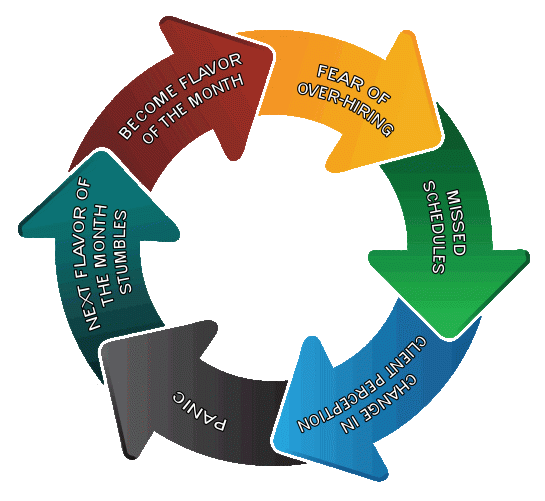My wife, who is in the professional recruiting and staffing business and is a successful sales account manager, laughed at me when I described for her my different jobs as a group manager in an engineering corporation. “That’s four different jobs,” she laughed, “no wonder you’re burnt out.” I had to admit, I didn’t disagree with her. How could you be a jack of all trades and be the a top performer at any one of those roles? Project management alone is a full-time career. Being an expert, i.e. project engineer or practicing technical professional and staying on top of the latest technology, innovation, regulations, and methodologies is a full-time career. Operations management, if done correctly, is a full-time career. And, of course, sales and account management, if you’re really going to stay out in front of your peers, is a full-time career. Is being mediocre at any of these roles an acceptable outcome since everyone else in the industry is doing it the same way? The answer is a definitive no. To be successful and to create corporate cultures that are among the top performing in the engineering industry, engineering corporations must be willing to clearly identify roles in the company and break out of the rut of thinking in terms of chargeability for every position as the defining measure for success. One thing that has remained consistent in the industry is when it comes to annual reviews, chargeability is always on the list of goals. However, I have seen chargeability noted as less than 5 or 10 percent of an individuals goals and yet, when it comes down to it, chargeability is constantly the mantra and is typically one of the primary reasons people are let go at organizations, i.e. you are costing the company money and we must increase profitability via high chargeability across the organization. I don’t disagree that chargeability amongst engineering professionals in an engineering corporation must remain high or the entire business model fails. However, it’s in how roles within the company are defined and in aligning the company and individuals within an organization that allows them to be successful. In other words, creating clearly defined roles, some of which are purely overhead, may improve engineering chargeability and profitability while at the same time reducing burn-out and frustration levels for professional engineers. For this model I see four distinct roles which must be defined within the industry as follows:
- Project Engineering leading to Practicing Technical Professionals (PTP)
- Project Engineering leading to Project Management Professionals
- Business Development, Sales, and Account Management
- Engineer Led or Business Management Led Operations Management
Project Engineering and Project Management
The first two roles follow the traditional paths provided in engineering, however, what often fails to be seen is that not all technical professionals want to be or have the skills to be project managers. In the IT business for example, project management is actually a lesser compensated role than is actual programming and software development. In other words, technical competence is at the top of the food chain rather than management. Should this not be the case in engineering? Are we truly turning out professionals that are at the top of their game, who know the industry, regulations, and theory inside and out so that they can provide innovative solutions to their clients or are we creating a watered down group of project managers who have some level of technical expertise, but never truly have the time to invest in being the absolute best at what they do? I feel, quite confidently, that several large engineering firms are now embracing this idea and are creating PTP type positions. The follow-on challenge is, are clients willing to pay for that type of technical expertise? I believe the answer is yes, if it is messaged correctly and we do a better job of selling our profession. That’s an entire topic in itself. For now, it is clear to me that we as an industry must provide these two career paths to professionals so as not to encourage individuals to run to project management because they perceive that’s where the money is. In fact, perhaps we reconsider the idea that project managers should make more money than PTP types. How do we do that? By creating clear roles for business development and operations management and letting project managers be project managers. In other words, let both of these roles by highly chargeable by reducing their responsibilities to sell and manage operations.
Business Development and Sales
Sales is a very poorly understood career path in the engineering industry. It is often perceived as a secondary job assignment to project engineering, project management, or operations management. But if you look at other industries, sales is typically an entire group or division unto itself. And I’m not talking about proposal writing and preparation. Let’s be clear, that is a support function in an organization that supports the sales team, it’s not the sales team itself. Engineering is a challenging industry in that sales professionals must come from within. We must understand our clients’ needs and have enough technical background to establish trust and rapport with the client. Typically the professionals identified as “sales professionals” in engineering organizations are project managers who have significant relationships with large clients such as the Corps of Engineers and their value is in knowing who to talk to at those organizations to obtain work, whether it be sole source or via the solicitation process. These professionals are highly compensated, commanding six figure salaries that put them in the top 10% or higher within an engineering organization. Some of clear sales goals and some seem to just have client management roles. In my experience, very rarely have these individuals brought me work or opportunities at the group level and that is a significant problem. I was not consulted, nobody knew the unique skill-set of my group, and these managers had no idea what type of work my team was interested in pursuing. How can this be? How can it be successful? And not only that, if the organization is going to be successful, shouldn’t there be some succession planning and relationship development so when these individuals either leave the organization the relationship with the client goes on? The bottom line is there is no perfect or right way to manage the sales side of an engineering corporation, but one thing is clear, being a sales professional is complete job in itself.
Developing client relationships, identifying opportunities, linking up talent in the organization to clients, setting up meetings with company talent and decision makers, developing winning proposal strategies, organizing teaming agreements, preparing winning proposals, and following up on current performance and debriefing on project performance is a full-time job. And finally, sales are measured with metrics. It’s uncomfortable, but to measure a sales persons success there must be clear measurable metrics in place so that they know what their focus should be on a daily basis as well as what their sales goals are. Everyone will be happier when those metrics are in place. This eliminates the ambiguity that sometimes exists for sales professionals in engineering. There also seems to be a fear of creating positions with lower base salaries with sales goals and significant reward via commission. The excuse tends to be, “that proposal was worked on by everyone, so how can one person get the commission on the sale?” I believe that is an uncomfortable question because the sales professional is not taking the lead from start to finish on a sale. If you, as a sales professional have the relationship with the client, identify the opportunity, set up the meetings necessary to pre-wire the job, lead the proposal development, and lead the team through the job interview then you have successfully led the sale. If you have a relationship with a client, identify the job lead, drop the lead on a project managers lap and walk away, you have not successfully led the sale. I think the latter is the reality in today’s marketplace.
Cearly identifying the client service manager (CSM) is a critical component of the process. At what level does this occur some would ask because clients can have multiple needs, i.e. transportation design, transportation planning, traffic engineering, stormwater planning and design, structural design, environmental planning and permitting, and the list goes on. How can one person handle all of that successfully? Don’t we need multiple CSM’s? Not necessarily, but I think looking at CSM’s that serve the different business lines within the company is a worthwhile endeavor to ensure that those business lines are getting the most bang for their buck with each potential client. If the CSM is a multi-faceted individual who knows and sells the complete talent within the company and has goals to do so then one CSM might work, however a CSM for multi-disciplined clients should not reside within one business line or you’re likely to only achieve sales for that one business line.
Defining these sales positions will not necessarily eliminate the need for project managers to assist in sales. Project managers and engineers will be required to attend client meetings, participate in strategy development, and also write technical approaches for proposals. However, they will not be fully responsible for managing clients from the sales side, identifying all opportunities, and being the proposal managers on every effort. The idea is to relieve the managers and engineers of their day-to-day sales roles in order to keep them focused on the business of engineering; delivering projects to their clients that meet quality, budget, and schedule. The question of how many dollars of revenue will generate the need for a CSM is a good starting point. Clearly sales managers will have multiple clients they service in most cases, but sometimes one client may be a full-time job. For example, a state transportation agency would likely be a full-time job or possibly two full-time jobs. Local municipalities may warrant one CSM for multiple clients. Another potential is to have CSM’s that serve different business lines. Each company must decide which strategy meets their organizational needs. However, the bottom line is, project engineers and managers must feel that the CSM is directly providing them value based on hard metrics, otherwise there will be resentment and “class envy” within the organization. A sales position should not be perceived as a place to coast when one is burned out on project engineering and management. Instead, it must be perceived as a challenging position that is sought out by those who feel they have the skills and desire to do the job. Don’t want to do sales? Then don’t seek out this position. Love developing relationships, fitting skills to needs, winning work, and having the confidence to meet sales goals; then this position may be for you.
Operations Management
I was a participant in a leadership program at one of the large engineering firms I was working for at the time. Each year, the leadership program participants, in addition to the main goal of learning about acquisition and mergers and corporate strategy and growth, were assigned a project. Our particular project was to evaluate the potential for a Business Manager position that would support the group and divisional management positions. It was up to us to determine what the duties of the role would be and where in the company these individuals would sit, i.e. in what location on the organizational chart. Like many positions that are needed at large companies this one would be a purely overhead role. Out the window with profitability unless creating this position would somehow allow engineers to be more billable. At the time I felt like we created an overhead type administrative position that would sit under the CFO and would essentially help group and division managers with operations. However, it’s hard to train someone at the administrative level everything they need to be looking for within the operational numbers and how they can help with management. Where this position was implemented it felt more like an accounting type position that would show up to try to ask the project manager why more revenue wasn’t being earned. Not a real team building or support like position. But out of this brainstorming and position development and in talking with people of other industries I got to thinking. What if you created operational positions that weren’t necessarily engineering led and also weren’t necessarily the high paying unit director positions we were used to seeing? Why create a division manager position and take good project managers away from their clients and away from what they do best and which makes money; project management and technical work?
Teams need to be managed. Of that there is no doubt. However, personnel management for professional development, peer review, and technical performance are separate issues than managing chargeability, budgeting, capital costs, invoicing and budget management and/or profitability. Creating positions that slightly increase responsibility, say for an engineer to be a technical group manager who oversees professional development would not take away as much time from performing billable engineering work. On the other side, business professionals that have business training, i.e. MBA’s, might improve performance of operational units, reduce costs of management, and result in increased chargeability. Clearly having an MBA in an operations role, the goal would not be chargeability. This allows the professional to truly focus on operations, assisting a technical group manager or project managers to understand project performance, staff utilization, revenue projects, and the like without having to stop the business of engineering to learn business. Typically division manager or operations manager positions are filled by promoted project managers or group managers. These individuals are highly compensated and can become high overhead cost to an organization. To offset this, organizations create chargeability goals for these individuals of 40 to 50 percent. This keeps them from being totally and completely focused on the business operation and also forces them to find ways to be a value on engineering projects without becoming a bottle-neck in project delivery. It’s a significant challenge. At best, the manager has large jobs for which they can charge management time and keep up their chargeability. At worst, these hours get billed and clients wonder why someone who is an operations manager is charging to their project. It’s typically a lose-lose situation. If you are trying to build a culture of trust with your client, having principal level or division manager types bill to your project is not the way, unless that client specifically wants that person on the project.
In Summary
Much more can be said about clarifying roles at corporate engineering firms, but the point of this discussion is to rethink the multi-tasking role of the engineer and to try to create an environment that promotes chargeability while taking away non-chargeable responsibilities. Keep project engineers, technical professionals, and project managers as billable and as focused on project work and clients as possible. Define clear sales roles and management roles that have low chargeability, but define those positions in ways that rethink the pay rate, i.e. don’t pay for a senior project manager to be a part-time sales guy or a part time operations manager. Instead, create sales (client service manager) positions that potentially have a lower base pay with motivation for performance via commission and create operations manager positions using business professionals who have no chargeable goals. Again, the goal is higher chargeability for engineering professionals across the board and more focus on engineering work without all the distraction of sales and operations.



